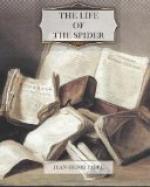Even so does the Narbonne Lycosa struggle when we try to take away her pill. Each displays the same pluck and the same devotion; and also the same denseness in distinguishing her property from that of others. The Lycosa accepts without hesitation any strange pill which she is, given in exchange for her own; she confuses alien produce with the produce of her ovaries and her silk-factory. Those hallowed words, maternal love, were out of place here: it is an impetuous, an almost mechanical impulse, wherein real affection plays no part whatever. The beautiful Spider of the rock-roses is no more generously endowed. When moved from her nest to another of the same kind, she settles upon it and never stirs from it, even though the different arrangement of the leafy fence be such as to warn her that she is not really at home. Provided that she have satin under her feet, she does not notice her mistake; she watches over another’s nest with the same vigilance which she might show in watching over her own.
The Lycosa surpasses her in maternal blindness. She fastens to her spinnerets and dangles, by way of a bag of eggs, a ball of cork polished with my file, a paper pellet, a little ball of thread. In order to discover if the Thomisus is capable of a similar error, I gathered some broken pieces of silk-worm’s cocoon into a closed cone, turning the fragments so as to bring the smoother and more delicate inner surface outside. My attempt was unsuccessful. When removed from her home and placed on the artificial wallet, the mother Thomisus obstinately refused to settle there. Can she be more clear-sighted than the Lycosa? Perhaps so. Let us not be too extravagant with our praise, however; the imitation of the bag was a very clumsy one.
The work of laying is finished by the end of May, after which, lying flat on the ceiling of her nest, the mother never leaves her guard-room, either by night or day. Seeing her look so thin and wrinkled, I imagine that I can please her by bringing her a provision of Bees, as I was wont to do. I have misjudged her needs. The Bee, hitherto her favourite dish, tempts her no longer. In vain does the prey buzz close by, an easy capture within the cage: the watcher does not shift from her post, takes no notice of the windfall. She lives exclusively upon maternal devotion, a commendable but unsubstantial fare. And so I see her pining away from day to day, becoming more and more wrinkled. What is the withered thing waiting for, before expiring? She is waiting for her children to emerge; the dying creature is still of use to them.
When the Banded Epeira’s little ones issue from their balloon, they have long been orphans. There is none to come to their assistance; and they have not the strength to free themselves unaided. The balloon has to split automatically and to scatter the youngsters and their flossy mattress all mixed up together. The Thomisus’ wallet, sheathed in leaves over the greater part of its surface, never bursts; nor does the lid rise, so carefully is it sealed down. Nevertheless, after the delivery of the brood, we see, at the edge of the lid, a small, gaping hole, an exit-window. Who contrived this window, which was not there at first?




